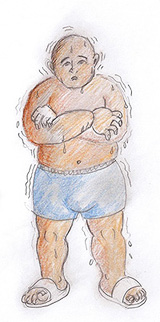According to the
Five Element Theory, sweat is the fluid of
heart, and is transformed from
essence of the body, heavy sweating is not a good sign. Abnormal sweating will result, if
yin and yang disharmony happens inside the body, and
striae”] under the skin becomes loose; TCM regards the conditions as sweating syndrome in general.
In daytime while rest, individuals experience sweating and become aggravated during motion is known as “spontaneous sweating”. For some people, they only sweat during sleep but will stop when awake, which is known as “night sweats.” Excessive sweating can happen alone, however it is more common to accompany with other health problems. Abnormal sweating is a common clinical difficulty. Traditional Chinese Medicine (TCM) has accumulated relative systemic yet complete understanding about sweat syndrome, and the efficacy of herbal treatment for it is quiet desirable.
Many factors can affect the sweating process and lead to abnormal sweating. TCM views the development of excessive sweating in the following way:
 In TCM experience, sweat heavily over the entire body tends to have a low level of qi (vital energy) which makes people experience chills, breath shortness, fatigue and get cold and flu easily.
In TCM experience, sweat heavily over the entire body tends to have a low level of qi (vital energy) which makes people experience chills, breath shortness, fatigue and get cold and flu easily.
Lung deficiency
Protective qi, which is governed by the
lungs, regulates the external body, such as warming the muscles, keeping the skin moist, enriching the subcutaneous tissues, and managing the opening and closing of the sweat pores. When the lung system is under-functioning or there is insufficient protective qi, the skin and its underlying tissues become saggy; TCM regards this as a weakness of the external body, a disharmony called "insecure striae" that can lead to excessive sweating.
Disharmony between nutrient and defensive phases
When
external pathogens attacking the body, it can lead to progressive pathological changes, and affect the body in various locations and severity. When disharmony between
nutrient and defensive phases occurs and interrupts the distribution of body fluids and blood, it will trigger abnormal sweating.
Insufficiency of heart blood
TCM claims that
blood and
body fluids come from the same origin, sweat is a fluid of the heart system. Excessive sweating is considered an exploitation of qi and blood of the heart, leading to symptoms such as palpitations and insomnia. Clinically, people who sweat abnormally usually have a heart deficiency. If such sweating is spontaneous, the disharmony belongs to a deficiency of the heart yang. If it takes place at night, the disharmony belongs to a deficiency of heart yin. People who overuse their brains tend to develop heart deficiency and store less blood.
Hyperactive fire due to yin deficiency
Blood and essence are important
yin components of the body; if they are depleted, the internal body will become unbalanced and can easily generate
fire pathogens. The fire pathogens can irritate the body fluids and force them to emerge out of the body. Yin deficient disharmony can result from chronic illness or unhealthy life habits.
Stagnant heat evaporating body fluids
Internal heat is often the end transformation of anything causing body disharmony, including invasions of exogenous pathogens, mental distress or improper diet. The heat promotes the vaporization of body fluids, and excessive sweating is a sign showing that the body is overheated and need to cool down.
 In TCM experience, sweat heavily over the entire body tends to have a low level of qi (vital energy) which makes people experience chills, breath shortness, fatigue and get cold and flu easily.
In TCM experience, sweat heavily over the entire body tends to have a low level of qi (vital energy) which makes people experience chills, breath shortness, fatigue and get cold and flu easily.
 In TCM experience, sweat heavily over the entire body tends to have a low level of qi (vital energy) which makes people experience chills, breath shortness, fatigue and get cold and flu easily.
In TCM experience, sweat heavily over the entire body tends to have a low level of qi (vital energy) which makes people experience chills, breath shortness, fatigue and get cold and flu easily.

